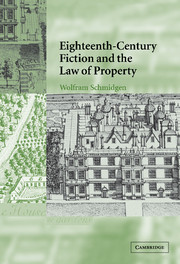Book contents
- Frontmatter
- Contents
- Acknowledgments
- Introduction
- 1 Communal form and the transitional culture of the eighteenth-century novel
- 2 Terra nullius, cannibalism, and the natural law of appropriation in Robinson Crusoe
- 3 Henry Fielding and the common law of plenitude
- 4 Commodity fetishism in heterogeneous spaces
- 5 Ann Radcliffe and the political economy of Gothic space
- 6 Scottish law and Waverley's museum of property
- Conclusion
- Notes
- Bibliography
- Index
2 - Terra nullius, cannibalism, and the natural law of appropriation in Robinson Crusoe
Published online by Cambridge University Press: 22 September 2009
- Frontmatter
- Contents
- Acknowledgments
- Introduction
- 1 Communal form and the transitional culture of the eighteenth-century novel
- 2 Terra nullius, cannibalism, and the natural law of appropriation in Robinson Crusoe
- 3 Henry Fielding and the common law of plenitude
- 4 Commodity fetishism in heterogeneous spaces
- 5 Ann Radcliffe and the political economy of Gothic space
- 6 Scottish law and Waverley's museum of property
- Conclusion
- Notes
- Bibliography
- Index
Summary
Alan Ryan once suggested that English law “discouraged” inquiry into the phenomenology and genesis of ownership. Unlike civil law, the basis of most European legal systems, common law is unable to answer questions such as “‘What is it to be the owner of something?’ or ‘How does a thing become mine?’” This is so because common law treats the fact of possession as a fundamental social given. Its main concern is with describing the established ways in which property can be held and conveyed; the problem of how something can be appropriated that was not previously owned remains outside its conceptual boundaries. This treatment of possession as a fait accompli is most strikingly illuminated by the doctrine of universal possession, introduced by the Normans as nulle terre sans seigneur. According to a fundamental fiction of common law, all English land originally belonged to the English crown. In all of England there is not one piece of land that is not possessed – either by the crown directly or by those who hold, through the system of English tenure, mediately or immediately from the crown. The only aspect of common law that deals with the problem of how something becomes property is known as “occupation” – a term that has central significance in natural law. In common law, however, occupation is marginal. “The laws of England,” as William Blackstone points out, have “confined [occupation] within a very narrow compass.
- Type
- Chapter
- Information
- Eighteenth-Century Fiction and the Law of Property , pp. 32 - 62Publisher: Cambridge University PressPrint publication year: 2002

